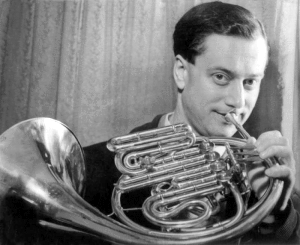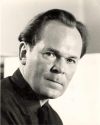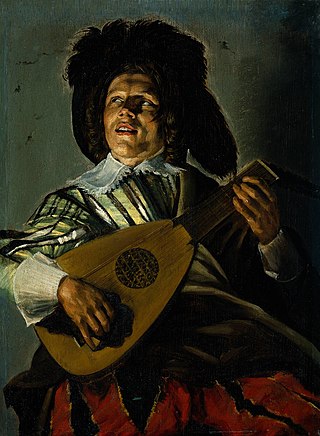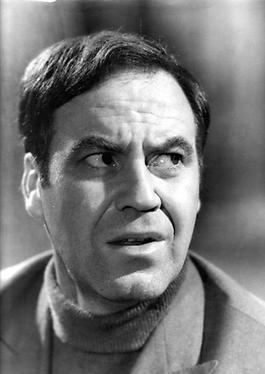Related Research Articles

Edward Benjamin Britten, Baron Britten was an English composer, conductor, and pianist. He was a central figure of 20th-century British music, with a range of works including opera, other vocal music, orchestral and chamber pieces. His best-known works include the opera Peter Grimes (1945), the War Requiem (1962) and the orchestral showpiece The Young Person's Guide to the Orchestra (1945).

Sir Peter Neville Luard Pears was an English tenor. His career was closely associated with the composer Benjamin Britten, his personal and professional partner for nearly forty years.

Dennis Brain was a British horn player. From a musical family – his father and grandfather were horn players – he attended the Royal Academy of Music in London. During the Second World War he served in the Royal Air Force, playing in its band and orchestra. After the war, he was the principal horn of the Philharmonia and Royal Philharmonic orchestras, and played in chamber ensembles.

Stuart Oliver Knussen was a British composer and conductor.

Humphrey Searle was an English composer and writer on music. His music combines aspects of late Romanticism and modernist serialism, particularly reminiscent of his primary influences, Franz Liszt, Arnold Schoenberg and Anton Webern, who was briefly his teacher. As a writer on music, Searle published texts on numerous topics; he was an authority on the music of Franz Liszt, and created the initial cataloguing system for his works.

In music, a serenade is a musical composition or performance delivered in honour of someone or something. Serenades are typically calm, light pieces of music. The term comes from the Italian word serenata, which itself derives from the Latin serenus. Sense influenced by Italian sera "evening", from Latin sera, fem. of serus "late".

Albert Herring, Op. 39, is a chamber opera in three acts by Benjamin Britten.

The Rape of Lucretia is an opera in two acts by Benjamin Britten, written for Kathleen Ferrier, who performed the title role. Ronald Duncan based his English libretto on André Obey's play Le Viol de Lucrèce.

Noye's Fludde is a one-act opera by the British composer Benjamin Britten, intended primarily for amateur performers, particularly children. First performed on 18 June 1958 at that year's Aldeburgh Festival, it is based on the 15th-century Chester "mystery" or "miracle" play which recounts the Old Testament story of Noah's Ark. Britten specified that the opera should be staged in churches or large halls, not in a theatre.
The English Opera Group was a small company of British musicians formed in 1947 by the composer Benjamin Britten for the purpose of presenting his and other, primarily British, composers' operatic works. The group later expanded to present larger-scale works, and was renamed the English Music Theatre Company. The organisation produced its last opera and ceased to run in 1980.
(Albert) Meredith Davies CBE was a British conductor, renowned for his advocacy of English music by composers such as Benjamin Britten, Frederick Delius and Ralph Vaughan Williams.

Theo Altmeyer was a German classical tenor. Although he was a successful opera singer, he is chiefly remembered for his work as an oratorio soloist. He possessed a rich and lyrical voice that he employed with great expression and nuance.

Cecil Aronowitz was a British viola player, a founding member of the Melos Ensemble, a leading chamber musician, and an influential teacher at the Royal College of Music and the Royal Northern College of Music.
Terence Weil was a British cellist, principal cellist of the English Chamber Orchestra, a founding member of the Melos Ensemble, a leading chamber musician and an influential teacher at the Royal Northern College of Music.
Variations on an Elizabethan Theme is a set of variations for string orchestra, written collaboratively in 1952 by six English composers: Lennox Berkeley, Benjamin Britten, Arthur Oldham, Humphrey Searle, Michael Tippett and William Walton.
Emelie Victoria Georgina Hooke was an Australian soprano who was notable in opera, oratorio and concert, and sang in Australia, England, Europe and South Africa.
Benjamin Britten's Sinfonietta was composed in 1932, at the age of 18, while he was a student at the Royal College of Music. It was first performed in 1933 at The Ballet Club, London conducted by Iris Lemare. It was published as his Op. 1 and dedicated to his teacher Frank Bridge.
Sydney Chamber Opera is an opera company based in Sydney, Australia. It is a resident company at Carriageworks. The company was founded in 2010 by Louis Garrick and Jack Symonds. Its first production was in February 2011 and it has since produced between two and four 20th- and 21st-century chamber operas each year. Its repertoire typically consists of world premieres of Australian operas and recent international works receiving their Australian premieres, including stagings of song cycles or non-traditional stage works.
The Diary of a Madman is a one-act chamber opera by the composer Humphrey Searle, who also wrote the libretto based on the eponymous short story by Nikolai Gogol. The opera was premiered in 1958 in Berlin.
References
- Notes
- ↑ "Chamber Opera" in Oxford Music Online , accessed 19 December 2016. (subscription required).
- ↑ Searle (1958), p. (iii).
- Sources
- Searle, Humphrey (1958). The Diary of a Madman. London and Mainz: Schott and Co.